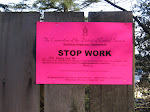Three Unfair Motions & Their Implications
THREE MOTIONS were passed at Council September 4th that should have all Central Saanich residents concerned. They effectively frustrate and reduce citizen participation.
MOTION 1:
This motion allows any late correspondence (correspondence received after noon on the Wednesday prior to the meeting), to be left for the following regular council meeting 2 weeks later. This was amended from its more strident form thanks to Councillor Graham, but there still is a great likelihood that what citizens’ feel is important and possibly urgent will be set aside and forgotten.
MOTION 2:
This motion says that “ …once Council has made a decision on a matter and/or referred the matter to a future process or meeting for further consideration, any further correspondence…pertaining to that same matter shall be referred directly by Staff to the appropriate file, and…a copy of the correspondence shall be placed on the Agenda of the next Regular Council Meeting under Section XIII (Correspondence – Receive for General Information).”
MOTION 3:
“That should a letter…be received that in the opinion of the Administrator, in consultation with the Mayor, is deemed to constitute inappropriate remarks about an individual member(s) of Municipal Staff, the Administrator shall be authorized to not automatically place the correspondence on the next Regular Council Meeting Agenda pending the receipt of further advice as may be deemed appropriate. In such cases, the Administrator shall immediately circulate the correspondence, with a covering memo to each Council member, apprising them of the action taken.”
THE EFFECT of these motions is seen when applied to the timetable of meetings.
THE DEADLINE for letters is Wednesday noon. The Agenda package for the Council is sent out to email subscribers at 10 am Friday. The Council meeting is on Monday. Citizens can also see the Agenda at the library as it is delivered there on Friday (times vary).
IF YOU SEE an item on the agenda for Monday that you would like to speak to, your letter will be late and may be forwarded to the next Regular Meeting two weeks later.
MEANWHILE the item comes up now and either a decision is made or the item is referred to another process (Motion 1). In two weeks your letter is relegated to Section XIII (the end of the agenda), where it may not come up until after 9 pm (could be later), if anyone allows you to speak to it at all, since it now refers to an item that has already been dealt with (Motion 2).
IF IT HAS BEEN redirected to another process, such as Strategic Planning, it may not come up for several months. Even if sent to another process it may not be addressed there as by then you’ve forgotten about it or Councillors may choose to overlook it. Councillor Bryson expressed his concern about this at the last Strategic Planning session and stated “it is our duty to reflect the concerns of the citizens” (March 2007).
IF YOU SHOW your anger or frustration with this system or any other aspect of municipal business in your letter, the Administrator and Mayor can decide to remove your letter from the agenda (Motion 3). Who defines what is “inappropriate”? Both Councillors King and Bryson expressed their concern about this item, Councillor Bryson stating that in his time on Council he had “never seen anything that [he] would label ‘inappropriate’.”
SO THE QUESTION rapidly becomes: what has happened to “demos kratos”, the rule by the people, that we say is so important to us? Are we only to exercise it once every 3 or 4 years? Are we meant to be silent the rest of the time?
MOTIONS LIKE these are periodically brought forward, encouraged or supported by Councillor Thompson. Since 2002 he has repeatedly tried to curb citizen participation. Why is this? We already have a disturbingly low participation rate of only 27% in municipal elections. Surely we want to hear from those willing to attend Council and share their thoughts with their elected representatives? In fact, isn’t it the case that our lack of participation often stems from the frustration we feel when we are belittled and ignored by those we elected to serve us?
THREE MOTIONS were passed at Council September 4th that should have all Central Saanich residents concerned. They effectively frustrate and reduce citizen participation.
MOTION 1:
This motion allows any late correspondence (correspondence received after noon on the Wednesday prior to the meeting), to be left for the following regular council meeting 2 weeks later. This was amended from its more strident form thanks to Councillor Graham, but there still is a great likelihood that what citizens’ feel is important and possibly urgent will be set aside and forgotten.
MOTION 2:
This motion says that “ …once Council has made a decision on a matter and/or referred the matter to a future process or meeting for further consideration, any further correspondence…pertaining to that same matter shall be referred directly by Staff to the appropriate file, and…a copy of the correspondence shall be placed on the Agenda of the next Regular Council Meeting under Section XIII (Correspondence – Receive for General Information).”
MOTION 3:
“That should a letter…be received that in the opinion of the Administrator, in consultation with the Mayor, is deemed to constitute inappropriate remarks about an individual member(s) of Municipal Staff, the Administrator shall be authorized to not automatically place the correspondence on the next Regular Council Meeting Agenda pending the receipt of further advice as may be deemed appropriate. In such cases, the Administrator shall immediately circulate the correspondence, with a covering memo to each Council member, apprising them of the action taken.”
THE EFFECT of these motions is seen when applied to the timetable of meetings.
THE DEADLINE for letters is Wednesday noon. The Agenda package for the Council is sent out to email subscribers at 10 am Friday. The Council meeting is on Monday. Citizens can also see the Agenda at the library as it is delivered there on Friday (times vary).
IF YOU SEE an item on the agenda for Monday that you would like to speak to, your letter will be late and may be forwarded to the next Regular Meeting two weeks later.
MEANWHILE the item comes up now and either a decision is made or the item is referred to another process (Motion 1). In two weeks your letter is relegated to Section XIII (the end of the agenda), where it may not come up until after 9 pm (could be later), if anyone allows you to speak to it at all, since it now refers to an item that has already been dealt with (Motion 2).
IF IT HAS BEEN redirected to another process, such as Strategic Planning, it may not come up for several months. Even if sent to another process it may not be addressed there as by then you’ve forgotten about it or Councillors may choose to overlook it. Councillor Bryson expressed his concern about this at the last Strategic Planning session and stated “it is our duty to reflect the concerns of the citizens” (March 2007).
IF YOU SHOW your anger or frustration with this system or any other aspect of municipal business in your letter, the Administrator and Mayor can decide to remove your letter from the agenda (Motion 3). Who defines what is “inappropriate”? Both Councillors King and Bryson expressed their concern about this item, Councillor Bryson stating that in his time on Council he had “never seen anything that [he] would label ‘inappropriate’.”
SO THE QUESTION rapidly becomes: what has happened to “demos kratos”, the rule by the people, that we say is so important to us? Are we only to exercise it once every 3 or 4 years? Are we meant to be silent the rest of the time?
MOTIONS LIKE these are periodically brought forward, encouraged or supported by Councillor Thompson. Since 2002 he has repeatedly tried to curb citizen participation. Why is this? We already have a disturbingly low participation rate of only 27% in municipal elections. Surely we want to hear from those willing to attend Council and share their thoughts with their elected representatives? In fact, isn’t it the case that our lack of participation often stems from the frustration we feel when we are belittled and ignored by those we elected to serve us?
UNLIKE OTHER levels of government, municipalities are expected to be open and approachable, but Councillors Garrison and Graham both expressed concern that the same people were coming to Council over and over (as if there was, or should be, some limit set). Some people come frequently because they are interested in their local community and where it is heading. Others come back because they feel dissatisfied with the answers they have received from staff or from Council on a previous occasion. Criticism is not destructive. An angry or frustrated citizen usually has a point that should be listened to with respect.
RESPECT IS an interesting issue at Council too. Councillor Graham has twice in the past few weeks made a comment that “respect is a two-way street.” What he doesn’t seem to understand is that the two-way street begins with those who have all the power. Councillors have the last word after a citizen speaks. They have a vote on each and every issue that comes forward. And they have slander and libel laws to protect them from unfair comment. As citizens, we can only urge them to hear us, and hope that they are listening.
NOT LISTENING has been a major problem at Council. It is very disturbing when some Councillors choose to roll their eyes while you are speaking, or make little sounds of disagreement, or stare at the table, read another item or turn their back on you to indicate their boredom. They rarely acknowledge that it is hard for members of the public to get up and speak and even harder when they feel they’ve been mislead or treated rudely.
BUT THAT’S NOT ALL. Councillor Graham has several times expressed his concern that members of the public are using “inflammatory language.” It’s hard to know exactly what he means by this. Some people take time to prepare their remarks so that they don’t forget the things they want to say and others simply become impassioned when they see the eye-rolling or are interrupted and told to keep it short. Of course many of us use big words and elegant phrases to try and find a way to get through to some Councillors: surely this is ‘free speech’ and to be appreciated not condemned?
YOU MIGHT THINK that time is the reason for the changes. Are the meetings too long? During the previous administration meetings often went to midnight and frequently to well beyond that. This Council however has generally been able to end around 10 pm and sometimes as early as 8:30 pm. It is unlikely that time spent at Council is a factor.
TIME TO READ and “digest” the late letters is a factor according to Councillor Thompson, but it’s a privilege he does not want to extend to the public. Late letters are usually only two to four paragraphs long and often the writers are making very similar points. Generally there are 10 or fewer late letters. Even when the letters are longer it’s hard to imagine that an intelligent Councillor can’t scan them and get the gist of them in just a few minutes.
BUT IF THERE WAS something that needed extra time for consideration, surely Council could always refer the agenda item and its letters to the next Council meeting? Late letters tend to indicate the public has not had time to speak to the issue and that is not surprising when important items appear on the agenda without notice and after the deadline for letters has passed.
IT WOULD BE better to delay the contentious item than just to move the letters to a future agenda where they won’t be addressed because the item has already been dealt with. It would also be wise for public notice to be given at one Council for an item known to be coming up at the next Council. Anyone trying to bring forward an issue without due notice should be told it must wait until proper notice has been given to the public (unless the issue is an emergency).
THESE UNHERALDED MOTIONS were rushed through with no notice (other than the Friday agenda package), and calls by Councillors King and Bryson to defer them to a committee meeting to allow for public consultation were ignored. Remember Councillor Thompson’s comment that he needs “time to digest” what is in the letters? Why were the citizens not allowed “time to digest” and comment on these undemocratic motions? One has to wonder why the unseemly hurry? What other issues are coming up that need public input smothered?
SOME COUNCILLORS suggested that citizens could contact them by phone or email to discuss upcoming issues. This unfortunately leads to private conversations being used “as if they were authoritative” as noted by Councillor Bryson. In the past such discussions between a Councillor and a citizen often led to situations where the citizen said they were told one thing and the elected official said they were told something else. In fact there were times in the past when citizens were told that there would be no further discussion of their issues because they had already had a private conversation with the Mayor. There is a reason for the presence of a public gallery at Council meetings. Private conversations lead to confusion. Open meetings provide clarity and are a cornerstone in any democratic society: witnesses and minutes are important.
IT HAS BEEN SUGGESTED by some Councillors that these motions won’t harm us because we are far ahead of other municipalities on these issues. This is debatable since it depends on which municipalities you wish to look at, but why should we compare ourselves to others? As Councillor King said, “We should have a higher standard than other municipalities.” Why shouldn’t we be the leaders?
THERE IS NO QUESTION: these motions should immediately be repealed.
VOTING RECORD:
FOR THE MOTIONS: Councillors Garrison, Graham, Thompson & Mayor Mar
AGAINST THE MOTIONS: Councillors Bryson & King
ABSENT: Councillor Mason
Prepared by Sue Stroud
sue_stroud@hotmail.com
RESPECT IS an interesting issue at Council too. Councillor Graham has twice in the past few weeks made a comment that “respect is a two-way street.” What he doesn’t seem to understand is that the two-way street begins with those who have all the power. Councillors have the last word after a citizen speaks. They have a vote on each and every issue that comes forward. And they have slander and libel laws to protect them from unfair comment. As citizens, we can only urge them to hear us, and hope that they are listening.
NOT LISTENING has been a major problem at Council. It is very disturbing when some Councillors choose to roll their eyes while you are speaking, or make little sounds of disagreement, or stare at the table, read another item or turn their back on you to indicate their boredom. They rarely acknowledge that it is hard for members of the public to get up and speak and even harder when they feel they’ve been mislead or treated rudely.
BUT THAT’S NOT ALL. Councillor Graham has several times expressed his concern that members of the public are using “inflammatory language.” It’s hard to know exactly what he means by this. Some people take time to prepare their remarks so that they don’t forget the things they want to say and others simply become impassioned when they see the eye-rolling or are interrupted and told to keep it short. Of course many of us use big words and elegant phrases to try and find a way to get through to some Councillors: surely this is ‘free speech’ and to be appreciated not condemned?
YOU MIGHT THINK that time is the reason for the changes. Are the meetings too long? During the previous administration meetings often went to midnight and frequently to well beyond that. This Council however has generally been able to end around 10 pm and sometimes as early as 8:30 pm. It is unlikely that time spent at Council is a factor.
TIME TO READ and “digest” the late letters is a factor according to Councillor Thompson, but it’s a privilege he does not want to extend to the public. Late letters are usually only two to four paragraphs long and often the writers are making very similar points. Generally there are 10 or fewer late letters. Even when the letters are longer it’s hard to imagine that an intelligent Councillor can’t scan them and get the gist of them in just a few minutes.
BUT IF THERE WAS something that needed extra time for consideration, surely Council could always refer the agenda item and its letters to the next Council meeting? Late letters tend to indicate the public has not had time to speak to the issue and that is not surprising when important items appear on the agenda without notice and after the deadline for letters has passed.
IT WOULD BE better to delay the contentious item than just to move the letters to a future agenda where they won’t be addressed because the item has already been dealt with. It would also be wise for public notice to be given at one Council for an item known to be coming up at the next Council. Anyone trying to bring forward an issue without due notice should be told it must wait until proper notice has been given to the public (unless the issue is an emergency).
THESE UNHERALDED MOTIONS were rushed through with no notice (other than the Friday agenda package), and calls by Councillors King and Bryson to defer them to a committee meeting to allow for public consultation were ignored. Remember Councillor Thompson’s comment that he needs “time to digest” what is in the letters? Why were the citizens not allowed “time to digest” and comment on these undemocratic motions? One has to wonder why the unseemly hurry? What other issues are coming up that need public input smothered?
SOME COUNCILLORS suggested that citizens could contact them by phone or email to discuss upcoming issues. This unfortunately leads to private conversations being used “as if they were authoritative” as noted by Councillor Bryson. In the past such discussions between a Councillor and a citizen often led to situations where the citizen said they were told one thing and the elected official said they were told something else. In fact there were times in the past when citizens were told that there would be no further discussion of their issues because they had already had a private conversation with the Mayor. There is a reason for the presence of a public gallery at Council meetings. Private conversations lead to confusion. Open meetings provide clarity and are a cornerstone in any democratic society: witnesses and minutes are important.
IT HAS BEEN SUGGESTED by some Councillors that these motions won’t harm us because we are far ahead of other municipalities on these issues. This is debatable since it depends on which municipalities you wish to look at, but why should we compare ourselves to others? As Councillor King said, “We should have a higher standard than other municipalities.” Why shouldn’t we be the leaders?
THERE IS NO QUESTION: these motions should immediately be repealed.
VOTING RECORD:
FOR THE MOTIONS: Councillors Garrison, Graham, Thompson & Mayor Mar
AGAINST THE MOTIONS: Councillors Bryson & King
ABSENT: Councillor Mason
Prepared by Sue Stroud
sue_stroud@hotmail.com




















1 comment:
Sorry for my bad english. Thank you so much for your good post. Your post helped me in my college assignment, If you can provide me more details please email me.
Post a Comment